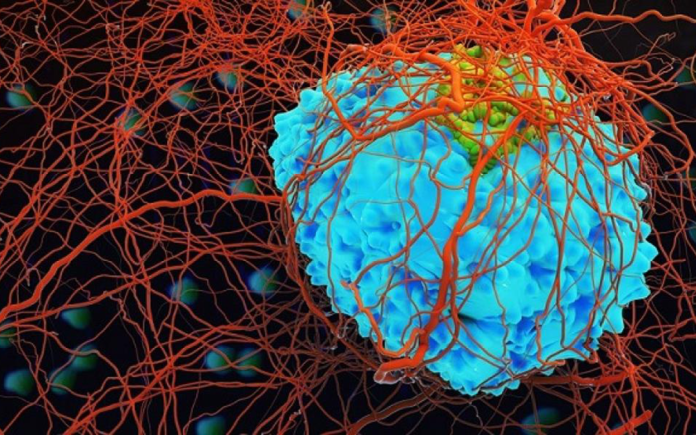
BY RUTH HILL R.N.
With a few exceptions, tumor cells throughout the body have cannabinoid receptors on their surface, and cannabinoids can bind to these receptors and induce apoptosis or programmed cell death. In other words, when THC or CBD binds to the cancer cell, it forces the cancer cell to commit suicide. A study by St. George’s University of London demonstrated that CBD was almost twice as powerful as THC in killing leukemia cells in a particular cell line. When THC and CBD were combined, the effect was twice as strong as CBD alone.
Other Promising Cannabinoids
Researchers also tested combinations of CBD and THC with Cannabigerol (CBG). CBD plus CBG proved to be an especially potent combination on one of the cell lines. CBD plus CBG showed mixed results. Interestingly, many tumors with a high level of malignancy and a tendency to metastasize have high levels of cannabinoid receptors, making them vulnerable to cannabinoid-induced apoptosis. Whereas CB1, CB2, or both must be present in the tumor cells for THC to induce apoptosis in the tumor.
How Cannabinoids Limit Tumor Growth
Cannabinoids block the production of vascular endothelial growth factor, which stimulates the growth of new blood vessels needed for cancer to grow. Without increased blood flow, the tumor does not have enough nutrition to sustain its development. It also increases reactive oxygen species (ROS), a mechanism THC and CBD use to kill cancer cells. Taking antioxidant supplements while using cannabis as an antineoplastic (anti-cancer) agent may be counterproductive.
Anticancer effects on ID-1 Gene (inhibitor of DNA binding 1)
Perhaps most intriguing is the downregulation of the ID-1 gene. ID-1 is a normal gene highly expressed in newborns and young children. There is little need for this in adulthood, and ID-1 activity in normal cells becomes nonexistent as humans grow older. However, cancer cells can reactivate this dormant gene and use it to promote their growth. ID-1 is overproduced in twenty types of cancer.
Best Time to Take Cannabis with Chemotherapy
There was more cancer cell death when the cannabinoids were administered after the chemotherapy than before it. Both CBD and THC can affect the metabolic breakdown of many chemotherapeutic drugs. Drug interactions can increase toxicity from chemotherapy by boosting blood drug levels of chemotherapeutic agents. Joe D. Goldstrich, MD advises his patients to stop using cannabis for 36 to 48 hours before chemotherapy and to start again 36 to 48 hours after their session. Learn more about the connection between cannabis and cancer from Dr. Joe D. Goldstrich’s new book The Cannabis Cancer Connection: how to use cannabis and hemp to kill cancer cells.
THC & CBD (Sativex®) with Temozolomide
GW Pharmaceuticals conducted a clinical trial using Sativex® in conjunction with temozolomide to treat recurrent glioblastoma multiforme (GBM). GBM is a highly aggressive brain tumor with a poor prognosis. There is no consistently successful pharmaceutical drug therapy available to treat it, and while temozolomide is one of the best pharmaceuticals currently used, effectiveness on its own is sorely lacking.
Research Shows CBN Kills Cancer
Cannabinol (CBN) was one of the cannabinoids found initially to be antineoplastic in experiments conducted as early as 1975. A more recent study has shown that a combination of THC, CBD, CBG, and CBN has the most powerful antineoplastic activity against estrogen-positive breast cancer cells.
A Patent for Combined CBGA & CBDA to Kill Cancer
GW Pharmaceuticals was awarded a patent in 2018 by the US Patent and Trademark Office for the use of CBGA and CBDA (the acid form of CBG and CBD), to kill cancer. These combinations have shown themselves to be synergistic in treating one or more: breast cancer; liver cancer; lung cancer; pancreatic cancer; melanoma; ovarian cancer; gastric cancer; renal cancer or bladder cancer.
Harvard Medical School and the University of Massachusetts found that a derivative of Cannflavin B, FBL-03G, demonstrates significant therapy potential in the treatment of pancreatic cancer. If you are interested in using medical cannabis for cancer treatment visit Synergy Wellness for a consultation by Leonard Leinow.
Learn Cannabis Education, Dosing Without the High on the 1st Saturday of the Month from 11 AM to 1 PM at the Vault Dispensary Lounge. Register Here. send comments to cannaangel16@gmail.com.










































